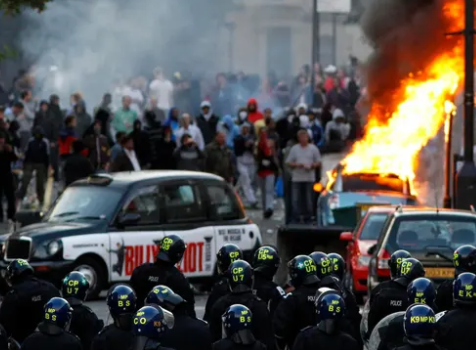Academic Hannah Awcock attended the 2010 protests as a student, and now lectures on the history of protest at the University of Edinburgh.
学者汉娜·阿考克以学生的身份参加了2010年的抗议活动,现在她在爱丁堡大学教授关于抗议的历史。
She explained that throughout history, from the 1866 Hyde Park suffrage riots to the student demos,
她解释说,纵观历史,从1866年海德公园选举骚乱到学生示威,
protest crowds have often pushed to go further than their organisers, or the authorities, will allow for.
抗议人群往往会走得比组织者或当局允许的更远。
And yet, as febrile as the atmosphere around Brexit and austerity has been in the nine years since the student protests and London riots,
尽管,自学生抗议和伦敦骚乱以来的9年里,围绕英国脱欧和财政紧缩的气氛一直很狂热,
large protests have appeared calmer, on the face of it at least.
但是至少从表面上看,大规模的抗议活动较为平静。
In the UK, "that really aggressive and confrontational policing that emerged post-9/11 seems to have diminished now," Awcock said.
阿考克表示,“现在在英国,911事件后出现的那种真正具有攻击性和对抗性的警务工作,似乎已经减少了。”
"Maybe it's because the protests themselves are less radical,
“或许是抗议者本身没有那么激进了,
but it's also because there's also been a turn towards more subtle methods of policing crowds,
但也是因为转向了更机智的方式来管制人群,
techniques like increased surveillance and intelligence gathering."
包括加强监视和情报收集等方式。”
The changes to crowd policing in the past decade owe a great deal to behind-the-scenes policy work by crowd psychologists.
过去十年间管制人群出现的变化很大程度上要归功于幕后的群众心理学家做的政策工作。
Clifford Stott has worked with police and football authorities for many years to discourage heavy-handed policing.
克利福德·斯托特多年来一直与警方和足球当局合作,阻止严厉的警察执法。
One turning point, he told me, was the 2011 Liberal Democrat conference in Sheffield, where South Yorkshire police trialled Stott's recommendations.
他告诉我,2011年在谢菲尔德举行的自由民主党会议是一个转折点,南约克郡警方在会上对斯托特的建议进行了测试。

Unlike Brighton, Liverpool, Birmingham or Manchester, the city was not used to hosting conferences for a party of government,
与布莱顿、利物浦、伯明翰或曼彻斯特不同,这座城市不习惯为政府举办会议,
and substantial student and anti-austerity protests were expected.
出现大量的学生和反紧缩抗议活动是意料之中的。
In preparation, police established a new "dialogue unit" of Police Liaison Teams (PLTs) in blue tabards,
在筹备工作中,警方成立了一个新的身着无袖制服的警察联络队“对话组”,
recruiting individuals to move among the crowd talking to them, rather than policing in numbers from the outside.
招募个人在人群中走动,与他们交谈,而不是大批地在外面管制。
"What we found was that these dialogue units were policing the police," said Stott. "
斯托特说,“我们发现这些对话组管制的是警察。”
They were stopping unnecessary interventions. The PLTs were reassuring the commanders that an intervention wasn't needed."
他们停止了不必要的介入。警察联络队向指挥官保证没有必要进行干预。
Instead of riot cops wading in, de-escalation and crowd self-regulation took over.
防暴警察没有介入,取而代之的是冲突降级和人群自律。
Since then, Stott said, this approach has become more common.
斯托特说,自那以后,这种方法就更常见了。
"Where the police have these capacities for dialogue and communication, there's less disorder. It's that simple."
“警方有这些对话和沟通的能力,混乱就会减少。就这么简单。”













